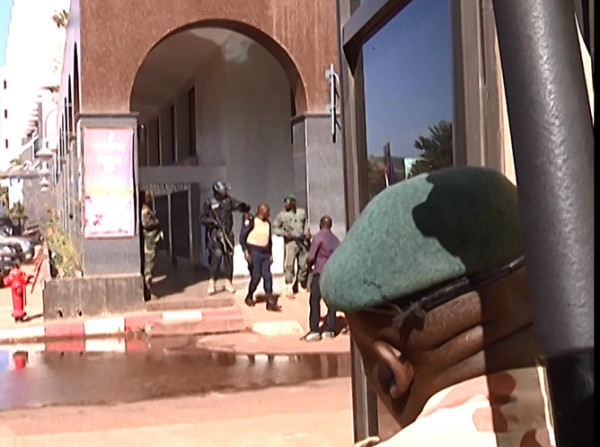
After a week in which Europe was rocked by terrorism on the streets of Paris, gunmen entered the Radisson Blu Hotel in Bamako, the capital of Mali. A hostage situation unfolded and French and Malian security forces battled for control of the building. It is a hotel that is known to be frequented by foreigners.
Islamist attacks have been concentrated in Mali’s north, but spread during 2015 to the centre of the country – and then to the south and the borders with Ivory Coast and Burkina Faso. On March 6, there was a terrorist attack on the restaurant La Terrasse in Bamako, in the south-west of the country. Five people were killed and nine were injured.
On June 10, there was an attack by armed men on Malian security forces in the town of Misseni, near the border with Ivory Coast. And on August 7, armed men attacked the town of Sévare in the Mopti region, north-east of Bamako. The attack lasted several hours, including a siege at a local hotel. Twelve people died, including two foreign nationals.
Coup, rebellion, intervention
The current cycle of violence in Mali, a former French colony, began in 2012 when Tuareg soldiers returned to northern Mali after fighting in the Libyan civil war. Forming the National Movement for the Liberation of Azawad (MNLA), they fought against the Malian government to win independence for the northern region of Azawad.
This conflict led to a coup that removed the president, Amadou Toumani Touré and the suspension of the constitution of Mali. Following this, the MNLA took control of three cities in the north and proclaimed Azawad’s independence from Mali in April 2012.
Taking advantage of this conflict, several Islamist groups moved in to intervene. Ansar Dine – which is Arabic for Defenders of Faith – and two other jihadist groups, al-Qaeda in the Islamic Mahgreb (AQIM) and the Movement for Oneness and Jihad in West Africa (MUJAO), were originally allied to the MNLA, but escalating violence led to international intervention by a French and African force that effectively destroyed the organisational structure of these groups.
The French government deployed its air force and 3,000 troops in 2013 to secure the north of the country at the request of the newly installed president, Dioncounda Traoré. Known as Operation Serval, the intervention lasted until July 2014 when the troops were redeployed as part of a wider offensive to combat unrest in the Sahel region.
A UN force, MINUMSA, has been on the ground since April 2013 with the aim of securing the north of the country – and, as of the end of June 2015, had just over 10,000 personnel in Mali.
Tuareg nationalists and Islamists struggled to reconcile their conflicting views for the newly independent region and, after several clashes, the MNLA renounced their claim of independence for Azawad and engaged with the Malian government in negotiations on its future status in 2014.
Despite talks resulting in in June 2015 in a UN-brokered peace between the main factions on both sides, the continuing violence illustrates the differences between the Tuareg nationalist and Islamist groups, but also the difficulties in maintaining peace in the country.
 Malian defense minister Tieman Coulibaly surveys the damage after a hotel siege in August in Sevare, Mali. Reuters
Malian defense minister Tieman Coulibaly surveys the damage after a hotel siege in August in Sevare, Mali. Reuters
According to a report by Human Rights Watch (HRW), several armed groups have increased violence against civilians accused of supporting French and UN troops deployed in the country. Small groups of Islamists and some Tuareg groups wedded to independence have managed to remain active and carried out occasional attacks in the desert.
HRW says that continuing criminal violence by these groups, as well as widespread abuses by the security forces, represents a serious threat to the population of Mali. HRW regards these two elements as fuelling discontent among the general population that could lead to increased recruitment to both Islamist and Tuareg groups and a threat to the gains made since the Franco-African intervention in 2013.
Localised terror
The similarity of the violence to other Islamist attacks should not, however, lead to us regard Mali as part of a monolithic Islamist threat. While there are several Islamist groups in Mali, such as the group Al Mourabitoune, they do not all share the same values or represent a global view of Islam. Much like the Nigerian Islamists of Boko Haram, the Islamists of Mali are products of very localised conditions, specifically decades of neglect and marginalisation in the north of the country.
Many of the Malian Islamists have been openly split on the question of affiliation with AQIM. MUJAO, for example, has defined itself specifically as a regional group with a local West African agenda rather than a globalised aim. Ansar Dine, one of the biggest groups in Mali, was sufficiently divided as to form a splinter group, the Islamic Movement for the Azawad and has been ambivalent towards both engagement with the government and also rejecting “all forms of extremism”.
Seeing the current increase in terrorist attacks in Mali as just another tentacle of globalised Islamic terrorism therefore misses the point. The mixture of groups within Mali are primarily the product of local historical conditions, not an externally imposed ideology.
Tensions between approaches to local issues and international, globalised aims and methods have themselves led to factionalism within both the Tuareg–nationalist groups and the Islamists.
Marginalisation of the Tuareg over decades, coupled with the alienating approach of successive southern-led governments in Bamako have led to the creation of ripe recruiting grounds for those who seek to perpetrate violence. By portraying the issue as an all-encompassing global Islamist threat, the international community fails to engage with the underlying structural issues of governance that produce these groups and escalate the threats in places like Mali.
This article has been republished from theConversation.com